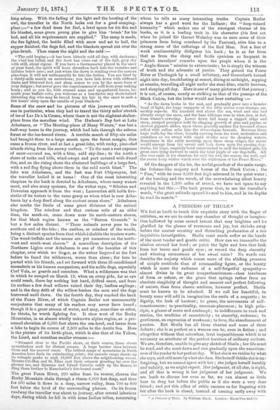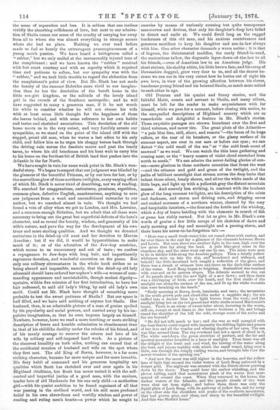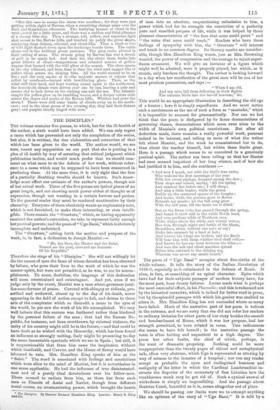A PRINCESS OF THULE.* Ws feel as loath to touch
this exquisite story with the finger of criticism, as we are to enter any chamber of thought or imagina- tion hallowed by some sacred tenant that may brighten and be glorified by the glance of reverence and joy, but shrinks away before the coarser scrutiny and disturbing profanation of a too- inquisitive investigation. Sheila must needs suffer at the hands of the most tender and gentle critic. How can we transcribe the nimbus around her head ; or paint the light and love that look from her brave and gentle eyes ; or record the deep sincerity and winning earnestness of her sweet voice ? No words can describe the majesty which comes more of the abiding presence of simple rectitude than of commanding figure, or the beauty which is more the radiance of a self-forgetful sympathy— almost divine in its great comprehensiveness—than loveliness. of form or colons, or the grace that springs rather from an absolute simplicity of thought and manner and perfect followiog of nature, than from classic outlines, however perfect. Sheila must be known to be admired. If we call her beautiful, to beauty some will add in imagination the smile of a coquette ; to dignity, the look of hauteur ; to grace, the movements of self- consciousness ; to practicality, common-placeness ; to high prin- ciple, a glance of scorn and contempt ; to indifference to rank and station, the crudities of eccentricity ; to sincerity, rudeness ; to gentleness, an expression of weakness ; to love, the abandonment of passion. But Sheila has all these charms and none of these defects ; she is as perfect as a Woman can be, even in fiction ; and altogether without that colourless, level impassibleness which is so necessary an attribute of the perfect heroines of ordinary authors. We are, therefore, unable to give any sketch of Sheila ; her life must be read, and she must dawn and rise gradually upon the conscious- ness of the reader to her perfect day. What she is we realise by what she says, and still more by what she does. She herself thinks she is un- forgiving, but we cannot agree with her ; she judges herself harshly and unfairly, as we might expect. Her judgment, of all else, is right,. and all that is wrong is her judgment of her judgment. We are loath to discuss her even so far, we can almost as little bear to drag her before the public as if she were a very dean friend ; and yet this office of critic excuses us for lingering with her after the book is closed, instead of turning sadly away with
• A Princess of Thule. By William Black. London: Maem'l'an and Co.
the sense of separation and loss. It is seldom that one realises vividly the absorbing selfishness of love, but next to our admira- tion of Sheila comes our sense of the cruelty of carrying her away from all to whom she was almost everything to strange scenes where she had no place. Nothing we ever read before made us feel so keenly the extravagant presumptuousness of a young man's passion. We have heard a bridegroom called a "robber," but we only smiled at the unreasonably injured tone of the complainant ; and we have known the " robber " received with but scant courtesy and with an asperity which it required time and patience to soften, but our sympathy was with the robber," and we took little trouble to regard the abduction from the complainant's point of view. But Mr. Black has not made the beauty of the summer Hebrides more vivid to our imagina- tion than be has the desolation of the bereft home in the little sea-girt kingdom, or the solitude of the lovely island girl in the crowds of the Southern metropolis ; and he will have suggested to many a generous man, if it be not worth his while to consider whether he will not choose his wife with at least some little thought for the happiness of those she leaves behind, and with some reference to her own habits and tastes and cherished associations. This desolation of the old home meets us in the very outset, and very forcibly arrests our sympathies, as we stand on the point of the island cliff with the rugged, proud old man, when he waves a last adieu to his only child, and follow him as he urges his shaggy horses back through the driving rain across the desolate moors and past the lonely tarns, to where his old henchman and his boat wait to carry him to his home on the furthest bit of British land that pushes into the Atlantic in the far North.
We have sought in vain for some weak point in Mr. Black's won- derful story. We began to suspect that our judgment was blinded by the glamour of the beautiful Princess, or by our love for her, or by the marvellous glow of those northern twilights, every varying effect of which Mr. Black is never tired of describing, nor we of reading. We. searched for exaggerations, caricatures, prosiness, repetition, common-place, defective English, anachronisms, anything to save our judgment from a weak and unconditional surrender to our author, but we searched almost in vain. We thought we had found a vein of alloy when we got to London, and Mrs. Lorraine, and a common-enough flirtation, but we admit that all these were necessary to bring out the great but superficial defects of the hero's character, and so reveal the beauty, wisdom, and generosity of his• wife's nature, and pave the way for the development of his own truer and more sterling qualities. And we thought we detected caricature in the dried-up old aunt and her devotion to Marcus Aurelius ; but if we did, it would be hypercriticism to make much of it ; or of the adoration of the Jew-boy musician, which seems to us unnecessary and out of taste ; we confess a repugnance to Jew-boys with long hair, and impertinently rapturous devotion, and wonderful execution on the piano. But only one solitary circumstance in the whole book strikes us as being absurd and impossible, namely, that the dried-up old lady aforesaid should have ordered her nephew's wife—a woman of com- manding appearance and unmistakable, though modest dignity— upstairs, within five minutes of her first introduction, to have her hair redressed, to said old lady's liking, by said old lady's own maid. Could not Mr. Black have thought of something more probable to test the sweet patience of Sheila ? But our space is half filled, and we have said nothing of anyone but Sheila. Her husband, then, is an admirable picture of a man of genius spoiled by his popularity and social powers, and carried away by his im- pulsive imagination, so that he even imposes largely on himself. Nowhere, however, have we read a more touching or more striking description of brave and humble submission to chastisement than in that of his childlike docility under the rebuke of his friend, and of his manly courage to recover the esteem and love of his wife by solitary and self-imposed hard work. As a picture of the sincerest humility on both sides, nothing can exceed that of the accidental reunion of husband and wife on the spot where they first met. The old King of Borva, however, is a far more striking character, because far more unique and far more loveable. His fiery habit of command and his generous hospitality are qualities which Scott has sketched over and over again in his Highland chieftians, but Scott has never united it with the self- control and impartial justice of a good man, with the anxious, tender love of old Mackenzie for his one only child—a motherless girl—with his quaint ambition to be found cognisant of all that was passing in the civilised world, and his still more profound belief in his own shrewdness and worldly wisdom and power of reading and ruling men's hearts—a power which he sought to I exercise by means of curiously cunning but quite transparent manoeuvres and devices, that only his daughter's deep love failed
to detect and smile at. We could dwell long on the ragged tenderness of this old man, and his anxious contrivances and generous sacrifices to keep his daughter and son-in-law always with him. One other character demands a warm notice ; it is that of Ingram, the disinterested meddler, the ready friend-in-need, the sententious talker, the dogmatic layer-down-of-the-law to all his friends,—even of American law to an American judge. His
short stature, his shabby attire, his little brown face, and his scrap of Devonshire doggrel, grow very dear to us, and all the dearer be- cause we can see in the very outset how he buries out of sight his own love, in view of the growing affection between his clever, handsome young friend and his beloved Sheila, so much more suited
to each other in age.
Old Duncan and his quaint and funny stories, and the faithful Mairi, cousin and servant to Sheila, and many others, must be left for the reader to make acquaintance with for himself, while we pass for a moment, before closing this notice, to the unequalled descriptions of Highland scenery which are so remarkable and delightful a feature in Mr. Black's stories. These exquisite passages are strewn broadcast over the first and third volumes, and never tire. The great plain of the Atlantic- " a pale blue line, still, silent, and remote "—the boom of its huge rollers, or the roar of its breakers, or the glassy surface of its summer aspect, are ever in our ears or before our eyes ; we can detect "the cold smell of the sea" or " the cold fresh scent of seaweed" as we read. We can watch the thin haze gathering and coming near, or the " heavy masses of violet cloud stretched from north to south." We can admire the never-failing glories of sun-
set—more glorious in these northern countries that front the west —and the crimson and gold and green of the twilight, and the paths of brilliant moonlight that stream across the deep lochs that indent those silent, lonely shores, and silver the white sands of the little bays, and light up with a yellowish grey the distant mountain masses. And scarcely less striking, in contrast with the lambent glow of the long summer twilights, are his description of the mists and darkness, and storm and driving rain, and dripping eaves and soaked morasses of a northern winter, cheered by the cosy and hospitable interiors,—the fires and the kettle and the whiskey, which a day of brave battling with the elements in search of fish or game has richly earned. But let us give in Mr. Black's own words of genius a few little scraps of his sketches of dawn and early morning and day and moonlight and a passing storm, and there leave his never-to-be-forgotten tale :- "Here Hero was a small fresh-water lake set round about with rushes, and far over there in the east lay a glimmer of the channels between Borva
and Lewis. But soon there was another light in the east, high over the low mists that lay along the land. A pale blue-grey arose in the cloudless sky, and the stars went out one by one. The mists were seen to lie in thicker folds along the desolate zalleys. Then a faintly yellow whiteness stole up into the sky, and broadened and widened, and behold! the little moorland loch caught a reflection of the glare, and there was a streak of crimson here and there on the dark-blue surface of the water. Loch Roag began to brighten. Suainabhal was touched
with rose-red on its eastern slopes. The Atlantic seemed to rise out of its purple sleep with the now light of a new dawn ; and then there
was a chirruping of birds over the heath, and the first shafts of the sunlight ran along the surface of the sea, and lit up the white wavelets that were breaking on the beach."
"Early morning at Borva, fresh, luminous, and rare ; the mountains in the south grown pale and cloud-like under a sapphire sky ; the sea ruffled into a darker blue by a light breeze from the west; and the sunlight lying hot on the red gravel and white shells around Mackenzie's house. There is an odour of sweet-brier about, hovering in the warm, still air, except at such times as the breeze freshens a bit, and brings round the shoulder of the hill the cold, strange scent of the rocks and the sea beyond."
"He did not talk much to her ; and she was so well occupied with the boat that he could regard with impunity the shifting lights and graces of her face and all the wonder and winning depths of her oyes. The sea was blue around them. The sky overhead had not a speck of cloud in it Tho white sand-bays, the green stretches of pasture, and the far and
spectral mountains trembled in a haze of sunlight. Then there was all the delight of the fresh and cool wind, the hissing of the water along the boat, and joyous rapidity with which the small vessel, lying over a little, ran through the crisply curling wares, and brought into view the newer wonders of the opening sea."
"And now the moon was still higher in the heavens, and the yellow lane of light that crossed the violet waters of Loch Roag quivered in a deeper gold. The night-air was scented with the Dutch clover growing down by the shore. They could hear the curlew whistling, and the plover calling, amid that monotonous plash of the waves that mur- mured all around the coast. When they returned to the house, the darker waters of the Atlantic, and the purple clouds of the west were shut out from sight ; and before them there was only the liquid plain of Loch Roag, with its pathway of yellow fire, and far away on the other side the shoulders and peaks of the southern mountains, that had grown grey, and clear, and sharp in the beautiful twilight. And this was Sheila's home."
"But this race to escape the storm was needless ; for they were just getting within sight of Barvas, when a surprising change came over the dark and thunderous afternoon. The hurrying masses of cloud in the west yarted for a little space, and there was a sudden and fitful glimmer of a stormy blue sky. Then a strange, soft, yellow, and vaporous light shot across to the Barvas hillg, and touched up palely the great slopes, rendering them distant, ethereal, and cloud-like. Then a shaft or two of wild light flashed down upon the landscape beside them. The cattle shone red in the brilliant green pastures. The grey rocks glowed in their Petting of moss. The stream going by Barvas Inn was a streak of gold in its sandy bed. And then the sky above them broke into great billows of cloud—tempestuous and rounded masses of golden vapour that burned with the wild glare of the sunset. The clear spaces in the sky widened, and from time to time the wind sent ragged bits of yellow cloud across the shining blue. All the world seemed to be on fire ; and the very smoke of it—the majestic masses of valour that rolled by overhead—burned with bewildering glare. Then, as the wind still blew hard, and kept veering round again to the north-west, the fiercely-lit clouds were driven over one by one, leaving a pale and serene sky to look down on the sinking sun and the sea. The Atlantic caught the yellow glow on its tumbling waves, and a deeper colour stole across the slopes and peaks of the Barvis hills. Whither had gone the storm ? There were still some banks of clouds away up in the north- east ; and in the clear green of the evening sky, they had their distant greys and purples faintly tinged with rose."




































 Previous page
Previous page